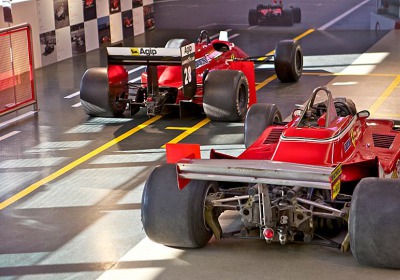Ferrari Galleria showcases racing history
Mon, 03 Jan 2011
It's cold in Maranello, Italy, and the crowds at the Ferrari Museum are at their smallest. It is more properly called Galleria because this small display is not designed to be a comprehensive museum, with row after row of rare Ferraris. Instead, it's a shrine to passion and is quite unique in the auto world.
When you enter the modern building, the first thing that strikes you is the sound--the glorious whine of a Ferrari racing V12 in full song.
As a history of Ferrari, this small display is more of a sketch. The big museums of Mercedes-Benz, BMW and Porsche offer collections that display just about every model made.
Entering the Galleria, the first Ferrari from 1947 greets you, painted in the original darker red. There are no ropes or stands, just polite "Do Not Touch" signs.
A long wall charts the history of Ferrari racing victories, illustrated periodically with pictures of the greats at the track--Ascari, Fangio, Lauda, Schumacher and all the others in the long history of the Scuderia. An early Formula One car is displayed with a 750 Monza, and in the corner sits an incredibly beautiful 250SWB, a picture of Enzo Ferrari on the wall seeming to urge it to go faster. All around is the sound of engines.
A recreation of the Ferrari pit wall has Berger and Villeneuve cars staged as if ready to go, the pit wall monitors showing nonstop action from the track.
Upstairs, a semicircle of winning F1 cars is set up as though bowing to the fans. Screens above them show the swaying crowds, the cheering pit teams singing the Italian national anthem for another Ferrari victory. Video clips of the greatest drivers are interspersed with historical stills.
Nearby, a huge display of constructors' trophies is made human by being fronted by a simple line of helmets of the drivers. The early helmets are flimsy things made of cloth and leather and are a vivid reminder of the risks, often fatal, that those early champions took at the dawn of modern motorsport. A small display of road cars includes an F40, an F50, an Enzo and a 275 GTB/4, as well as a Dino wearing its proper Dino badges, not the Ferrari logo so often substituted by owners. This is more conventional, reflecting the dual personality of the marque, and here the noise of the engines fades to a background hum.
This is what makes Galleria Ferrari so different. It has linked all the elements--people who built the cars, the teams that campaigned them, the emotions of the victories, the tifosi, and the will to win into a place that aims for the heart instead of the mind.
After leaving the Galleria and walking past the famous Ferrari gates a block away, I noticed a nondescript truck pulling out. As it left, the scarlet tail of a new 458 was visible. The workers were streaming in for a shift change, some in Ferrari red coveralls, others in civvies. Yet every single person displayed a Ferrari badge on their clothing. A few cars were being taken for test drives in the area, so the sound from the Galleria was replaced by the real thing. In the chilly Maranello sunlight, it was clear why Ferrari is the most popular F1 team in the world.
Ronan McGrath is a contributor to AutoWeek.
By Ronan McGrath

